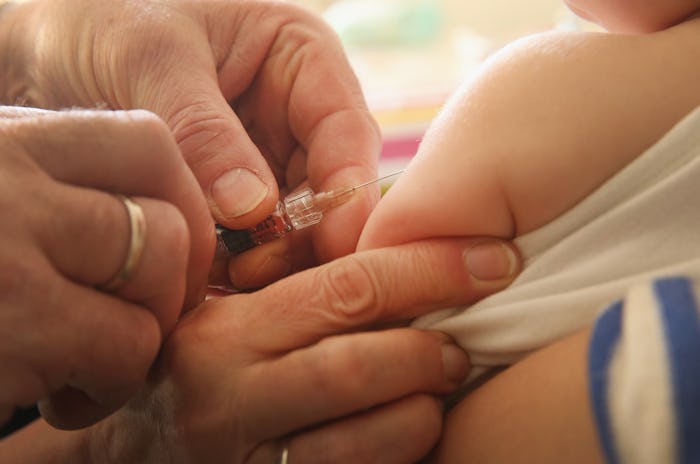Life

Child Vaccination Rates Around The World Are Not Great
Protecting children from diseases is so incredibly important. Vaccinations were developed for a reason, to halt the spread of disease and to protect others from getting deathly ill. While vaccinations are an incredible advancement for society as we know it, not every child out there is protected. In fact, child vaccination rates around the world are worse than you might think.
A new report, conducted by the World Health Organization and UNICEF, found that vaccine progress is in danger of stalling. According to the WHO, nearly 1 in 10 infants, or 12.9 million infants worldwide did not receive any vaccinations in 2016, including the critical DTP or DTaP vaccination, which protects children against diphtheria, tetanus, and pertussis (an estimated 6.6 million children worldwide did not receive their first dose). This is a serious problem. Since 2010, according to the WHO, the percentage of children who have received their full course of routine immunizations has plateaued at 86 percent, falling short of the global coverage target of 90 percent.
DTaP is essential for children in protecting them against diseases. Yet, 64 countries out of 195 aren't meeting DTaP vaccination goals, according to NPR, therefore indicating that they likely aren't meeting general vaccination goals either. DTaP is one of the most essential vaccines, according to the Centers for Disease Control and Prevention, and one of the first vaccinations that children get to protect against whooping cough and tetanus.
There are many roadblocks to children receiving the right vaccine, according to NPR, especially in war torn countries like Syria, where access to hospitals and medical clinics is limited, or places where basic health care isn't readily available, as in parts of India. In fact, an estimated 10 million infants still need to be vaccinated in the aforementioned 64 countries alone, according to the United Nations. As WHO Director of Immunization Dr. Jean-Marie Okwo-Bele explained in a statement:
Every contact with the health system must be seen as an opportunity to immunize. These children most likely have also not received any of the other basic health services. If we are able to raise the bar on global immunization coverage, health services must reach the unreached.
So what is the solution? According to the U.N., it is incredibly important for organizations like UNICEF to bring life saving vaccines to the poorest communities whenever possible, as immunization is one of the most important "pro-equity" interventions available. Countries like Ethiopia have begun trying to bridge the gap by recruiting over 30,000 workers to improve health care delivery, including vaccinations, according to NPR.
Knowing about the importance of vaccinations is vital as well, and not just in developing countries where vaccine rates are low. That education is important in the United States as well, where dangerous myths surrounding vaccines have lead to parents opting out of or delaying immunization, creating a separate, equally grave problem.
Higher vaccination rates around the world are crucial to keeping the population healthy — but proper awareness and education about those vaccines is just as important, in terms of continuing upward trends down the road.